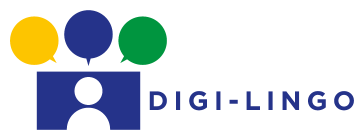Resources and tools
On this page you find concrete didactic resources and tools from Digi-Lingo.
Publications
Analytical framework and identification of best practices - Project result 1 - May 2023
The publication focuses primarily on the Pluriliteracies Teaching for Learning (PTL) approach, interculturality, and the use of digital tools in foreign language teaching.
The analysis and theoretical framework was made in collaboration with Mondragon University.
Analytical framework and identification of best practices (pdf).
Methodology and questionnaire
This publication presents our approach to Methodology and Questionnaire Design, featuring three distinct questionnaires aligned with key themes from our theoretical analytical framework. These questionnaires blend open-ended inquiries and Likert-scale assessments for practicality:
- Streamlining global data collection by eliminating the need for in-person interviews or focus groups.
- Ensuring participant accessibility, including the option for easy questionnaire translation, simplifying data analysis without transcription or translation from the participant's native language to English.
To gain a deeper understanding of our strategic decisions in data collection methodology we invite you to read the document.
Methodology and questionnaire (pdf).
Results and recommendations based on questionnaires
The publication brings together results and recommendations of each of the four countries in the project – Belgium, Denmark, Norway and Spain - from the extensive analytical framework and identification of best practises.
The results and recommendations of each country have been divided into three main categories:
- the four dimensions that form the PTDL model (Pluriliteracies Teaching for Deeper Learning)
- digital tools in FL (Foreign Language) teaching and learning
- significant differences among teachers' and students' perspective in each school.
In summary, six general recommendations have been deduced from the analysis.
Tools
Guidelines for digital foreign language learning, teaching and virtual pupils’ exchange
Guidelines for digital foreign language learning, teaching, and virtual pupils’ exchange’ consists of didactic and pedagogical guidelines for teachers on implementing digital tools in foreign language teaching. The guidelines are designed to help teachers optimise the use of new digital possibilities in their daily teaching practices.
These guidelines provide teachers with valuable recommendations, tips, and suggestions for practical tools. They cover a range of topics, including the integration of interactive platforms, the use of digital resources for language practice, and strategies for fostering student engagement, skills, and competencies through technology.
They also offer inspiration to headmasters, school policy teams, and school boards to enhance foreign language education.
The guidelines also provide questions based on the content of this document, intended to stimulate discussion and reflection among foreign language teachers within their own schools and across other schools.
Guidelines for digital foreign language learning, teaching and virtual pupil's exchange (pdf)
A shortened version in Danish: Guidelines for digital fremmedsprogslæring og -undervisning og virtuel elevudveksling (pdf)
Info in Norwegian: Guidelines and the DIGI-LINGO project.
An adapted version in Dutch: Guidelines for digital foreign language learning, teaching and virtual pupils’ exchange (pdf)
A translated version in Basque: Final guidelines (pdf).
Organisational Model for Setting up Virtual Exchanges for Language Learning
The organisational model is built around a self-paced, online module designed specifically for classroom practitioners eager to orchestrate virtual language learning exchanges. With insights from the DIGI-LINGO project, this module provides educators with the knowledge to connect their classrooms with peers in other countries, encouraging collaborative learning and global engagement.
Read more about the model and connect:
Organisational Model for Setting up Virtual Exchanges for Language Learning (pdf)
Find a danish version:
Organisatorisk model for etablering af virtuelle udvekslinger for sprogindlæring (pdf)
